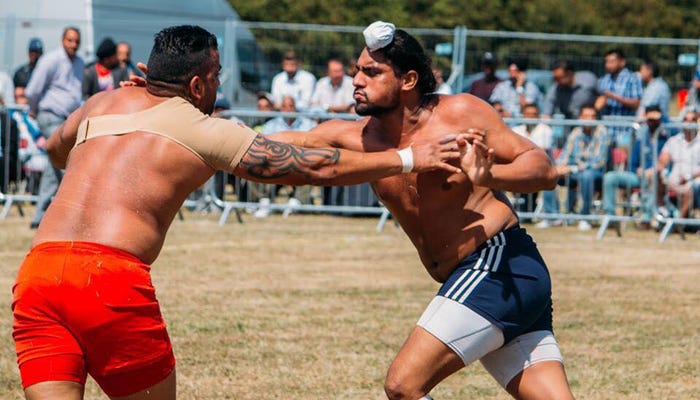Sikhi, Kabaddi, & the Spirit of Shaheedi
"On August 17th, Edmonton will host a Kabaddi tournament in honour of Shaheed Bhai Jaswant Singh Khalra."
Jungfateh Singh
August 17, 2025 | 3 min. Read | Opinion
On August 17th, Edmonton will host a Kabaddi tournament in honour of Shaheed Bhai Jaswant Singh Khalra, the fearless human rights defender who uncovered and documented the illegal killings and disappearances of thousands of Sikhs in Punjab during the 1990s. This gathering is not only a celebration of sport but a reaffirmation of the Sikh tradition that binds physical readiness, communal pride, and the remembrance of shaheeds into a living heritage.
Bhai Jaswant Singh Khalra’s life exemplified the Sikh principle of gareeb di rakhiya, jarvanay di bhakhiya — to protect the oppressed and dismantle tyranny. In exposing the mass cremations of unclaimed bodies by Punjab Police, he challenged the Delhi Takhat and its machinery of repression, fully aware that truth-telling in those times carried the risk of death. His abduction and murder in 1995 were intended to silence his voice, yet his shaheedi amplified the call for justice and preserved his name in the collective conscience of the Panth.
Kabaddi itself has always been more than a sport in Punjab. It is an expression of tyar-bar-tyar — the state of being ever-ready, physically and mentally — and resonates deeply with the Sikh martial ethos. It demands strength, agility, strategy, and collective coordination, echoing the Sikh ideal of Miri-Piri, where temporal skill serves spiritual and moral duty. The kabaddi field, like the akhara of the pahlwan, has been a training ground for discipline and honour, qualities revered in Sikh history.
Bhai Diljit Singh Bittu, in his writings on the Sikh sangarsh, recalls how wrestlers (pahlwans) in Punjab often admired the Khadku Singhs who fought in the armed struggle. This respect was not superficial — both worlds valued rigorous training, mastery over one’s body, and readiness to endure hardship for a higher purpose. In rural Punjab, kabaddi matches were sometimes dedicated to shaheeds, serving as both cultural celebration and political remembrance, reinforcing the idea that physical prowess must serve the cause of justice.
The Sikh concept of Patshahi — divine sovereignty bestowed upon the Khalsa — rejects subjugation (adheragi/gulaami) to worldly powers and calls for the creation of a Begampura-Halemi Raj, a fear-free and just society. Sport in this framework is not isolated from political and spiritual life. It is one dimension of kirat, dignified labour, and a means to build the physical and moral capabilities necessary for jujharoo (resistance) against oppression.
Shaheedi in Sikhi is the highest form of seva — selfless service. From Guru Arjan Sahib and Guru Tegh Bahadur Sahib to the countless Singhs and Singhnias remembered in the Ardas — “jinhan Singh-Singhnian ne dharam het sis ditte” — the Sikh tradition has placed fearlessness at the heart of life. Kabaddi tournaments held in honour of shaheeds are part of this cultural continuum, affirming that the Panth remembers and draws strength from its martyrs.
In the diaspora, especially in places like Edmonton, these tournaments serve an even greater role. They become spaces where younger generations connect to their heritage, where stories of the sangarsh are retold alongside the cheers for a daring raid or an unyielding tackle. They embody the Sikh principle of sanjiwalta — dignified coexistence — by bringing the community together in joy and remembrance.
Tomorrow’s event is thus more than a match; it is a living gurmatta of the sangat, an affirmation that Sikh culture, history, and resistance are inseparable. Every point scored, every player cheered, and every moment of collective pride is a reminder that the struggle for truth and dignity continues — in courts, on the streets, and yes, even on the kabaddi field.
By dedicating the tournament to Bhai Jaswant Singh Khalra, the Edmonton sangat asserts that shaheedi is not nostalgia but a guidepost for present and future action. It tells the next generation that strength must be guided by righteousness, that sport can carry memory, and that the Khalsa’s voice — Khalsa Jee Ke Bol Baalay — remains unyielding to injustice anywhere in the world.
Jungfateh Singh is an organizer, writer and producer, and has worked on Sikh issues across the globe for over 15 years.
Baaz is home to opinions, ideas, and original reporting for the Sikh and Punjabi diaspora. Support us by subscribing. Find us on Twitter, Instagram, Threads, Facebook, and TikTok at @BaazNewsOrg. If you would like to submit a written piece for consideration, please email us at editor@baaznews.org.




Shaheed bhai Jaswant Singh Khalra continues to inspire the community to fight peacefully an unjust and corrupt system that murdered tens of thousands of Punjabi Sikh youth none of them with any criminal cases against them . Till date none of the perpetrators - Punjab police , administration and politicians of the time - have been duly punished by successive Indian governments implying that it wasn’t a single political party’s failure but a ‘deep state’ anti Sikh polity that continues till date with state / agencies controlled media. An overall good article except the needless reference to so called ‘Khadku’ - who were no heroes and were t really ‘struggling for a cause’. In fact , their misguided and abhorrent actions were the excuse anti Sikh forces needed to unleash a reign of oppression , fake encounters , mob killings and creating an anti Sikh narrative . Bhai Khalra ji is the real hero , the Khadkus, quite the opposite.